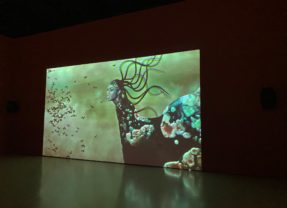Posted by CCL on Apr 24, 2023
Writing Across Worlds
Writing Across Worlds: In Converation with Victor Fernando R. Ocampo When: 28 April 2023, 12:00 — 13:20 Venue: Online Book your place Conversation with prolific Singapore-based Filipino writer Victor Fernando R. Ocampo, on his International Rubery Book Award shortlisted collection The Infinite Library and Other Stories, his influences and writing craft, and the state of speculative fiction in Southeast Asia today. Join us in conversation with prolific Singapore-based Filipino writer Victor Fernando R. Ocampo, on his International Rubery Book Award shortlisted collection The Infinite Library and Other Stories, his influences and writing craft, and the state of speculative fiction in Southeast Asia today. This discussion is hosted online and will be moderated by Malaysian editor and writer Zhui Ning Chang. Victor Fernando R. Ocampo is the author of the International Rubery Book Award shortlisted The Infinite Library and Other Stories (Math Paper Press, 2017; Gaudy Boy, 2021) and Here be Dragons (CANVAS Press, 2015), which won the Romeo Forbes Children’s Story Award in 2012. His writing has appeared in many publications including Apex Magazine, Daily Science Fiction, Future Fiction, Likhaan Journal, Strange Horizons, Philippines Graphic, Science Fiction World and The Quarterly Literature Review of Singapore, as well as anthologies like The Best New Singapore Short Stories, Fish Eats Lion: New Singaporean Speculative Fiction, LONTAR: The Journal of Southeast Asian Speculative Fiction, the Philippine Speculative Fiction series and Mapping New Stars: A Sourcebook on Philippine Speculative Fiction. He is a fellow of the Milford Science Fiction Writers’ Conference and a Jalan Besar writer-in-residence at Sing Lit Station (2020/2021). Zhui Ning Chang is a Malaysian editor, writer, and theatre practitioner based in London, UK. She serves as Fiction Editor at khōréō magazine, and is a co-editor on the Best of Malaysian Short Fiction in English 2010-2020 anthology. Her writing for performance includes queer romcom Seashore Yuanfen and time travel project Asian Pirate Musical; her essays and reviews have appeared in Strange Horizons, The BSFA Review, Library Journal, Fantasy/Animation, and more. Currently, she is a PhD researcher in transnational Southeast Asian speculative literature at Birkbeck, University of London. Featured image generated using...
Read more















Recent Comments